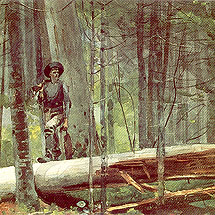| 5. Nature reserves |
 |

| All species have some function in the
ecosystems in which they live: they help maintain the level of oxygen
in the atmosphere, they accumulate and transform solar energy, they
produce nutrients, they help regulate the Earth’s climate, they
control plagues, they decompose organic waste, etc. And everything
that happens in the Earth’s ecosystems affects us. For example:
a tree can generate enough oxygen for 8 or 10 people, while a car
can consume in one hour the oxygen produced by 200 oak trees in a
day. If we do not want our natural ecosystems to disappear, we must
take measures to protect and conserve them. That is why human activities
are restricted in certain places: nature reserves. |


[ enlarge image ] |
 |
| Distinguishing causes and ends. We speak
of cause when we have reasons for saying that one occurrence
has resulted in another. We speak of end when we are referring
to what a person wants to achieve when she or he acts in a certain
way. The interrogative expression that we often use to ask about
the causes of something or the end of an action is why? |
| Of the following questions, say which are asking
about the cause (C) and which are asking about
the end (E). Some questions may be asking about
the cause and the end at the same time (C and E).
|
| 1. |
Why do green plants generate oxygen? |
| 2. |
Why should we protect green plants? |
| 3. |
Why do living organisms eat? |
| 4. |
Why should we eat a healthy diet? |
| 5. |
Why does what happens on Earth affect
people? |
| 6. |
Why can human activity
transform an ecosystem? |
| 7. |
Why should we conserve
ecosystems? |
|
|
 |
 |
| Painting. Felix Wallotton
, 1865-1925. The
Wind . |
 |
| Reading. Story: The
Copper Beech. |
 |
| Find information
about what the conditions are for a place to be called
a ‘nature reserve’. |

 |
| © Grup IREF 2003, with the support of the European Commission, DG XXII (Socrates/Comenius 3.2) |
[ print ] |
|
|
|
|